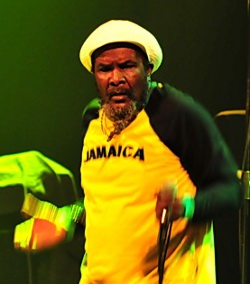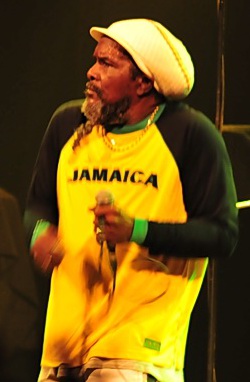Articles about reggae music, reviews, interviews, reports and more...
Pablo Moses in Brussels

Pablo Moses in Brussels
Reggae legend copper fastens his status.
Sampler

As time takes its toll on a galaxy of reggae musicians who have been called ashore by Jah, it is a real privilege to witness one of the living legends doing what he does best. And so, in late November Pablo Moses treated Brussels - the city of bureaucrats, business and big buildings - to a musical feast of conscious roots reggae. As part of a double bill featuring the soberly serious Linton Kwesi Johnson, it was encouraging to see ‘old school’ reggae draw a full house and light up the annual Brussels’ ‘Festival of Liberties’. The festival is described as a globalized expression of continuous activity in defence of the rights, liberties and values of universal democracy, despite the fact that it is held in a vast historic and beautiful former munitions/armaments store! Now in his 60s, but defying the laws of nature and biology, Moses dispelled any lingering doubts as to whether he would be able to deliver a high energy performance of distinction. Without question, this is exactly what he does.
Moses shot to fame in the mid-1970s on the back of the classic ‘Revolutionary Dream’ album, engineered at the infamous ‘Black Ark’ studio by the mercurial Lee ‘Scratch’ Perry, under the watchful eye of the late producer/keyboardist Geoffrey Chung. Reflecting the nature of the music business this classic album was well received but unprofitable for Moses. This prompted 2 years study at the Jamaica School of Music, though ten successive albums failed to emulate this mid-70s classic. Now after a 15 year gap comes 'The Rebirth’ - adorned by Jamaica’s very finest ‘players of instruments’. At last we have a real contender for high office, with Moses back to his best and the promise to see ‘at least three more new original conscious albums in the space of four years’. So put on your seat belt for what should be a lively ride, starting with ‘The Rebirth’, hosting 13 tracks with the cream of Jamaica’s reggae veterans on board, including Sly and Robbie, Dean Fraser, Skully, Sticky Thompson and Dwight Pinkney.
 Pablo Moses has been touring extensively in South, Central and North America, Canada, Europe, Scandinavia, Japan and the Caribbean for decades, though like many of his contemporaries, his biggest market is in Europe, with France featuring predominantly. In the course of a show running well over an hour Moses and his 5 piece Revolutionary Dream Band rightly replaced Brussels’ preoccupation with a ruinous recession with some real roots rock reggae. Nevertheless this was no ‘forget your troubles and dance’ Marley-esque type event. Moses is renowned for highlighting the ills of inequality and injustice, greed, corruption, racism, sexism, war, the abuse of mother Earth and the succour afforded him by Rastafarianism. Moses explains ‘I am always considered to be controversial. And I want to remain that way’. However he is eminently capable of addressing these themes in a lively manner, via intricate musical arrangements overlaid with his husky to haughty height voiced delivery and theatrical manner.
Pablo Moses has been touring extensively in South, Central and North America, Canada, Europe, Scandinavia, Japan and the Caribbean for decades, though like many of his contemporaries, his biggest market is in Europe, with France featuring predominantly. In the course of a show running well over an hour Moses and his 5 piece Revolutionary Dream Band rightly replaced Brussels’ preoccupation with a ruinous recession with some real roots rock reggae. Nevertheless this was no ‘forget your troubles and dance’ Marley-esque type event. Moses is renowned for highlighting the ills of inequality and injustice, greed, corruption, racism, sexism, war, the abuse of mother Earth and the succour afforded him by Rastafarianism. Moses explains ‘I am always considered to be controversial. And I want to remain that way’. However he is eminently capable of addressing these themes in a lively manner, via intricate musical arrangements overlaid with his husky to haughty height voiced delivery and theatrical manner.
Indeed such was the impact of his crack 5 piece support (in the form of Patrick Anderson (drums), Andrade Bowen (keyboards), Keith Francis (bass), Patrick Frazer (keyboards) and Kevin Patterson (guitar)) that the absence of a horns/brass section was barely noticeable. Dressed in a white peaked cap, bright yellow top roaring ‘JAMAICA’, white pants with rasta colour stripes and comfortable slipper type boots adorned with yet more signs of Rastafarianism the messiah appeared to a rapturous welcome
Opening with greetings to Brussels and his pleasure at the invitation to perform he swung promptly into ‘I Am A Rastaman’, confirming that he was ‘armed and ready’ with his ‘love melody’ for the ongoing revolution. Pursuing the same theme he followed with a frown upon ‘So Much’ shooting, crying and fighting before raising the roof with the incomparable ‘Dubbin Is A Must’ suitably accompanied by a jump that many half his age would not dare attempt! There followed a heavily echo-laden rendition of the popular and bouncy ‘Outlaw’ from his ‘Tension’ CD of the mid 1980s. Now in full flow Moses then advised his audience that ‘Rasta’ is ‘no gimmick’ and ‘no glamour’! Accompanied by much signalling, gesticulating, remonstrating and extended dance movements the maestro repeatedly exhorted his audience to ‘Hail Jah’ before competently cooling the tempo and warning that ‘we are living in a world of sin’ via the easy flowing ‘Woo-oo’ which reminded us that people are starving all over the world. Regrettably the sound faltered temporarily at this point, but Moses didn’t. Turning to the plague of shooting and looting he pleaded with his old pal ‘Charlie’ (from his 1990 ‘We Refuse’ CD) to leave this Rasta in peace, interspersed with extensive stage stalking, handshakes and ‘call and response’ techniques with his adoring audience. Having spun the audience into a musical fever Moses then took the risk of (successfully) silencing all before unleashing ‘A Song’ from his 1980 album of the same name, accompanied by manic hand movements as he directed proceedings with inspiration from his Majesty. Moving steadily through his extensive back catalogue Moses then selected the 1981 release ‘Pave The Way’ to ease us into his admonition of ‘Bad Boy’ Johnny whose lifestyle does not appeal the high standards of this Rastaman. Moses then propelled his microphone to the sky like his namesake is reputed to have done with his staff when parting the Red Sea when leading the Israelites out of slavery in Egypt. This was the signal for his most famous of all songs ‘Revolutionary Dream’, as he pleaded with his audience to ‘Come on, let me hear you, hear you’, which he surely did for a song that will surely outlive Moses and his audience! The new album ‘The Rebirth’ then got an airing via ‘Mama Yeah’, ‘More Than You Can Chew’ and ‘Born To Be Bad’, appropriately warranting much audience acclaim and what would pass for military manoeuvres from the maestro Moses. There was only one answer to his question “do you want more?” enabling ‘Ready Aim Fire’ to bring the audience to yet another high as Moses displayed even more energy and agility than was evident in his lively opening number. And so it was time for Moses to say ‘Merci Beaucoup’ leaving the audience the way every great artist leaves an audience – wanting more and more and more ....
 Reviewing his life’s fortunes, Moses explains that – without diluting the message of consciousness - he has frequently attempted to reach out to the ‘now generation’ – including those enamoured by the ‘dancehall style’: “I try to adapt to changing styles of music. I'm trying to reach the dancehall crowd, not just with the beat, but with a message that is cultural and sociologically connected”.
Reviewing his life’s fortunes, Moses explains that – without diluting the message of consciousness - he has frequently attempted to reach out to the ‘now generation’ – including those enamoured by the ‘dancehall style’: “I try to adapt to changing styles of music. I'm trying to reach the dancehall crowd, not just with the beat, but with a message that is cultural and sociologically connected”.
However the price paid for moving beyond one’s ‘comfort zone’ can be costly, as reflected in one reviewer’s (severe) categorisation of his 1995 ‘modern roots and light dancehall’ album as ‘contemporary crap’! However Moses is no stranger to adversity – including a skull drilling after a 4 day coma prompting ‘The Rebirth’ - and it is consoling to note that his first encounter with the Jamaican police on the charge of blowing ganga smoke into the face of children prompted his first (and still most famous hit) ‘I Man A Grasshopper’.
Though ‘highs’ and ‘lows’ are a feature of all lives, it is encouraging to see Moses return to his roots and what he does best, via ‘The Rebirth’ album. Long may this founding father of roots and culture reggae live.
Read more about this topic
Comments actually desactivated due to too much spams
Browse by categories
Recommended Articles
Latest articles
Recently addedView all
© 2007-2026 United Reggae. All Rights Reserved. Reproduction in whole or in part is prohibited. Read about copyright
Terms of use | About us | Contact us | Authors | Newsletter | A-Z














